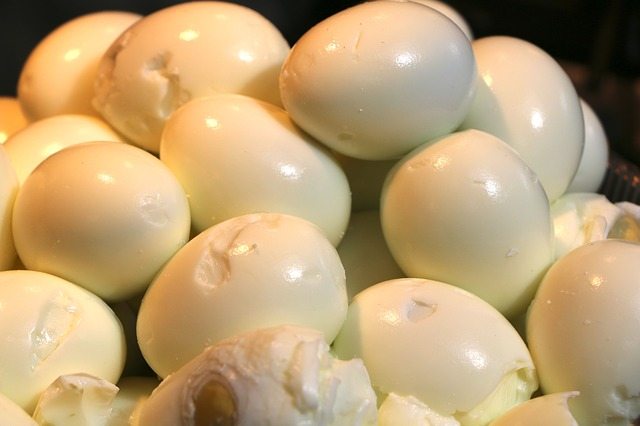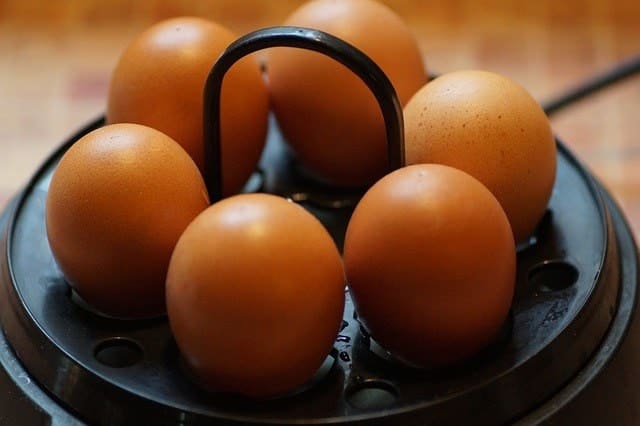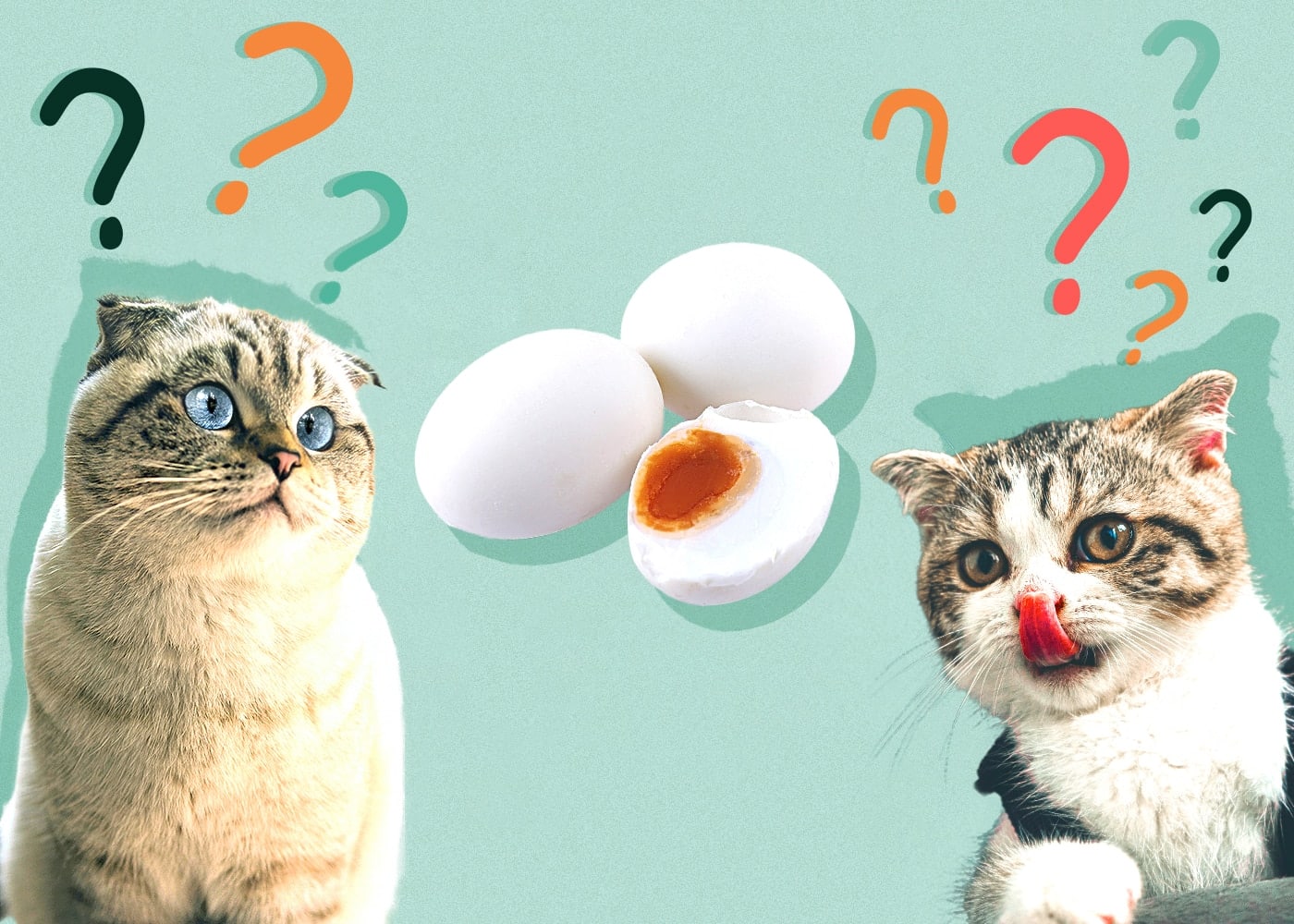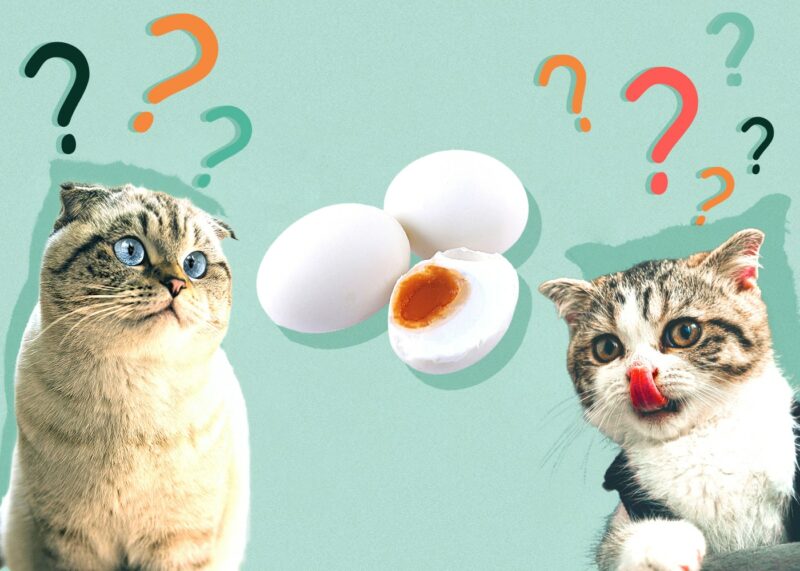It’s difficult not to treat your furry friend to a little piece of your meal, but there’s always some concern as to whether our cats can indulge in the same foods that we do. That concern is amplified with foods that can cause health-related issues for us. Hard-boiled eggs, for example, are healthy and nutritious but can cause problems with cholesterol if we eat them in excess. So, is it safe to feed our cats hard-boiled eggs? Luckily, the answer is yes!

Eggs Are Nutritious, Even for Cats
First, we should mention that hard-boiled eggs provide a great source of protein for humans and cats. Cats are meat-eaters by nature, and they require meals with plenty of protein. According to an article published by the ASPCA1, cats are “obligate carnivores,” and their diet must consist of meat. They also state that cats don’t process carbohydrates well, so their calories should come primarily from protein.

Do Eggs Need to Be Hard-Boiled?
Most certainly not! Hard-boiled eggs are easier to prepare, portion, and serve, making them great snacks. But the protein of a gently cooked egg white is more digestible, and a runny yolk is more nutritious. If your eggs are not fully cooked, we do recommend that you look for in-shell pasteurized eggs to avoid any potential bacterial contamination issues.
If you are unsure whether your eggs are pasteurized, to be on the safe side, make sure that any egg you serve your cat is entirely cooked. This means poached, overeasy, or any other runny egg shouldn’t make its way to your cat’s food dish if you do not know the origin.
How Should Eggs for My Cat Be Prepared?
It’s worth mentioning again here: Make sure the eggs you serve your cat are either in-shell pasteurized or fully cooked. Beyond that, don’t add seasonings, butter, or cheese to the eggs that you’re giving your cat. The things that we like to add to our eggs may cause issues if consumed by cats, so it is important to keep the egg simple and unseasoned. For this reason, hard-boiled eggs are probably best.
It’s also very important to make sure that you remove the entirety of the shell. If you are hard-boiling your eggs, you can give your cat the thin eggshell membrane that can sometimes remain stuck to the egg—it’s a great source of glucosamine! The easiest way to serve an egg is to cut it in half or quarter it, then chop or cut that portion into small pieces that your cat can chew and swallow easily.
How Often Can Cats Eat Eggs?
Like all things in life, too much of a good thing is bad. The average house cat should consume somewhere between 200 and 350 calories a day based on weight and activity levels.
One large hard-boiled egg contains around 78 calories, so feeding your cat eggs every day or multiple times a day can quickly get out of hand. To keep your feline’s weight at a healthy level, consider only adding eggs to their diet two to three times a week or so in relatively small portions.

Can Kittens Eat Hard-Boiled Eggs?
Eggs are just as safe for kittens as they are for fully-grown cats, so yes! However, kittens need far fewer calories than grown cats, so kittens should be given eggs in much smaller quantities to avoid overfeeding.
Follow all of the same protocols for preparing eggs for your kitten as you would your cat: Cook them fully, remove all portions of the shell, break up any pieces of the shell membrane, and chop the eggs into tiny pieces that your kitten won’t have problems chewing and swallowing.
As with adult cats, please ensure that your kittens are getting most of their calories from a complete and balanced diet. Treat eggs as add-ons or supplemental high-protein treats.
What If My Cat Doesn’t Like Hard-Boiled Eggs?
It’s no secret that cats can be exceptionally picky eaters. If your furball turns up their nose at the egg you’ve prepared, don’t worry. Eggs are certainly not essential for your cat’s health and well-being, so as long as you’re providing your cat with a complete and balanced diet, they will be perfectly fine without eggs.
Learning about what your cat can and cannot eat is a crucial part of keeping them happy and healthy! Choosing a bowl to serve cat-friendly foods in is another important decision pet owners face. Satisfy the specific needs of your cat with the innovative design of the Hepper NomNom Cat Bowl. Learn why it’s our (and our cats!) favorite food and water dish here. At Catster, we’ve admired Hepper for many years and decided to take a controlling ownership interest so that we could benefit from the outstanding designs of this cool cat company!
Summing Up
Our conclusion: yes, eggs are perfectly safe for cats to consume, provided that they’re in-shell pasteurized or fully cooked, unseasoned, entirely de-shelled, cut into small pieces, and aren’t added to their diets too often. It may seem like a high-maintenance breakfast, but the protein in an egg is great for your little kitty’s health. Did you really think owning a cat wasn’t going to be a little high-maintenance?












